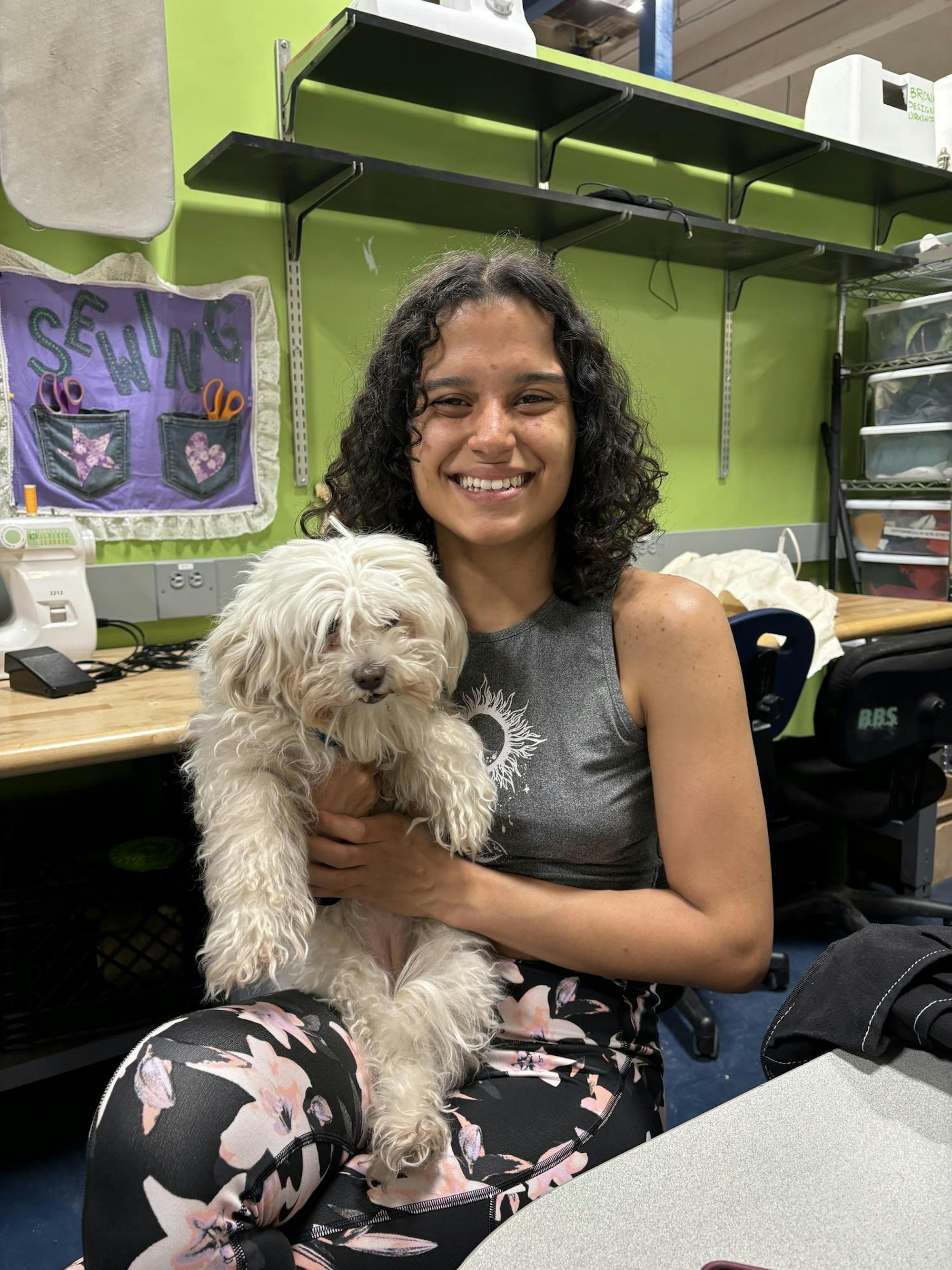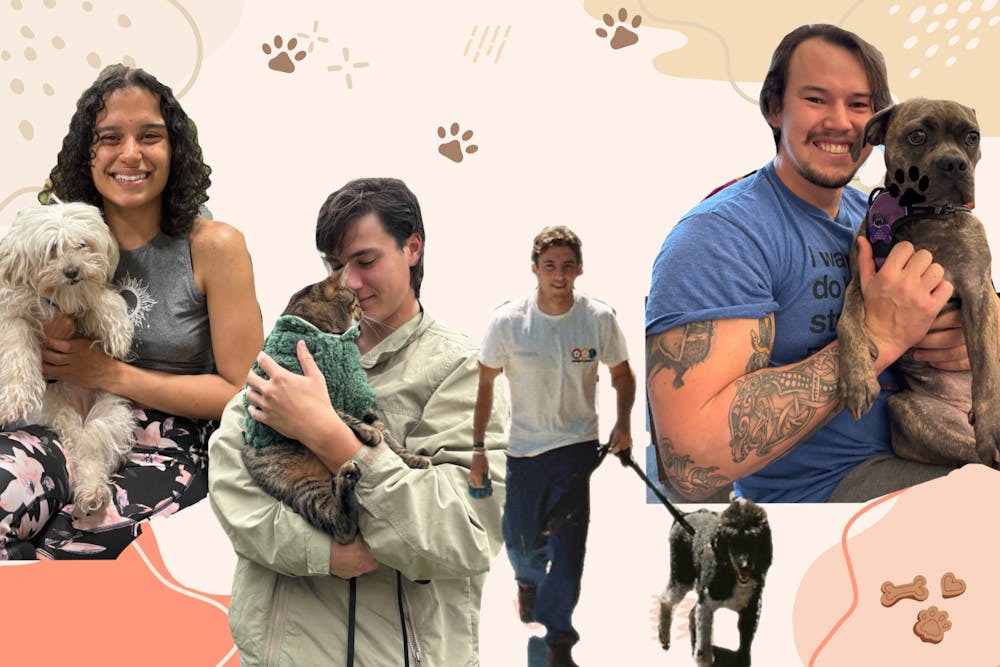When Bailey Phoenix ’24 entered their sophomore year at Brown, the COVID-19 pandemic was in full swing. “It was very rough,” they said. “I started struggling.”
At home, their dog Winter would attend to them during moments of distress. “She would do everything to distract me, licking my face,” Phoenix said. Winter has become “interconnected with my mental and physical health,” even attending Phoenix’s sessions with their therapist, they added.

When sophomore fall rolled around and things still weren’t looking any better, Phoenix thought of a possible solution: bringing Winter to Brown. After spring break of the same year, Winter was finally approved and able to come to Brown.
Since then, Phoenix’s time at Brown has become “so much better.” The two of them have developed a “symbiotic relationship,” Phoenix told The Herald.
“On days when I don’t want to get up, I have to take the dog out,” Phoenix said. “I have medications, but she has medications too. … I will not let her suffer.”
Despite being 13 years old, Winter is still “very spry for her age” and loves making human friends, though she holds “disdain” for other dogs, Phoenix said. When a dog three times her size came by to say hello during Phoenix’s interview with The Herald, Winter disinterestedly retreated to her on-the-go bed for a nap.
During their walks together around the main green, Phoenix said Winter loves being the center of attention — something that encourages Phoenix to be social. “She’s everyone’s emotional support animal,” said Phoenix.
For many students at Brown, pets help to relieve academic and personal stress. After his freshman year, Noah Urrutia ’25 decided to adopt his cat Merlin who, like his wizard namesake, is a “curious guy full of whimsy.” Urrutia registered Merlin as an emotional support animal with SAS at the beginning of his sophomore year, and the two have shared Urrutia’s dorm ever since.

“I couldn’t really think of being in college without him,” said Urrutia. “It’s always good to walk back (to your dorm) and see someone who’s happy to see you.”
Merlin, a “very, very smart” and “well behaved” cat who prefers the indoors, meowed in protest when it started raining during our interview outside. But Urrutia still takes him outside for a walk once a week.

“When he’s not in the bag, I’ll carry him on my shoulder and he just sits there like a parrot,” Urrutia said.
Urrutia noted that he wished more students were aware that they can bring their pets to Brown. For both Urrutia and Phoenix, the process involved obtaining a letter from a psychologist affirming the benefit of an emotional support animal, followed by the completion of disability verification and accommodation forms with SAS.
“I think for a lot of people who have issues with anxiety or loneliness or homesickness, this is a very good way to feel connected to your home,” Urrutia told The Herald.
For students without emotional support needs, off-campus housing makes bringing a pet to Brown easier. Together with his girlfriend, Richard Glebocki ’24 cares for a one-year-old pug-terrier crossbreed (who Glebocki said he suspects is really a pug-staffy) named Phoenix in their apartment.
While dog sitting over the summer, Glebocki and his girlfriend “fell in love” with the idea of adopting a dog of their own, he said. This winter break, they visited the Providence Animal Rescue League and found Phoenix. The result has been something “amazing.”

Walking around the main green has allowed both Glebocki and Phoenix to “make a lot of friends,” Glebocki told The Herald.
“It’s very, very social being a dog at Brown,” he added. “Human friends, dog friends, it’s all very easy.” Phoenix, who displayed a penchant for licking my hand as I typed interview notes, is “beloved across campus.”
While walking Phoenix around campus, Glebocki loves witnessing people’s reactions to her, he told The Herald. “You watch people’s faces turn from a very intense, focused state ... and just instantly light up,” Glebocki said.
But some students are unable to live off-campus or register for a service animal. Nathan Swidler ’24 has stumbled upon an unlikely solution: walking the dog of President Christina Paxson P’19 P’MD’20.
Swidler is the official dog-walker for Cooper, Paxson’s poodle. “I have to say (his name) in an American accent — otherwise, he won’t respond,” said Swidler, who is from London.

Swidler walking Cooper.
Courtesy of David Pinto
During his freshman year, Swidler took Paxson’s class titled “Economics of Higher Education,” which featured an end-of-seminar dinner. During a luckily-timed “loo break,” Swidler ran into Paxson’s husband, who sat with Cooper. It just so happened that they were looking for someone to walk him.
Swidler had no prior dog-walking experience. “But I looked up how to walk dogs, asked a bunch of my friends how to do it and they basically said it was very simple,” he said.
For the past three years, Swidler and Cooper have been walking biweekly loops around the Main and Quiet Greens together. “I really love it when people come up to me and ask if they can pet him,” said Swidler. “It makes my day and I get to meet so many new people.”
Swidler noted his gratitude for the opportunity to become closer with Paxson and her husband. “It humanizes the often pedestal image of the president,” he said. “She’s a woman of the people, she has a dog and she has a student walk it.”
Cooper’s favorite treat is a Blue Room sandwich. He “salivates whenever he sees one,” Swidler said. Winter shares a similar fondness for dining hall goodies, particularly the Ivy Room’s bacon. Both Glebocki’s pug-terrier Phoenix and Urrutia’s cat Merlin are content with more classical pet treats, enjoying false rawhide bones and catnip, respectively.
Swidler is currently searching for someone to fill his dog-walking position post-graduation. “There is no current next in succession,” said Swidler. “I’d be happy to field all loads of interest.”
Maya Nelson is a senior staff writer covering undergraduate student life. She’s interested in studying either English or Literary Arts and loves to read sci-fi and fantasy in her free time. She also enjoys playing guitar, crocheting and spending an unreasonable amount of time on NYT Spelling Bee.





